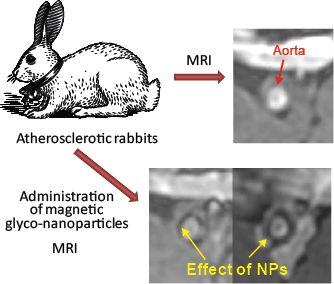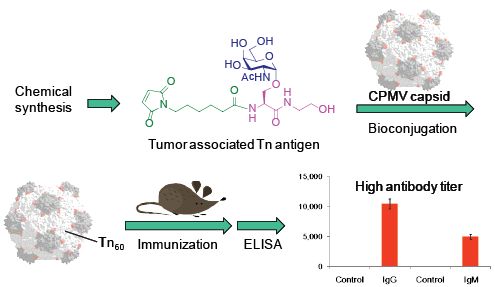Xuefei Huang

Research
Organic Chemistry, Synthetic Chemistry, Nanoscience and Immunology
(Research Description PDF)
The chemistry of carbohydrates and their biology is the major emphasis of our research. Carbohydrates play important roles in many biological processes such as inflammation, tumor metastasis, bacterial and viral infections. Detailed understanding of many of these processes is still lacking. Building on our strength in synthetic chemistry, we take a multi-disciplinary approach to study this important class of molecules. Our research encompasses several areas including synthetic organic chemistry, nanoscience and chemical immunology.
In the synthetic chemistry area, we are developing novel methodologies for assembling biologically active oligosaccharides and glycoconjugates. Traditional carbohydrate synthesis is very tedious and time-consuming. In order to expedite the synthetic process, we have developed novel one-pot glycosylation methodologies, where multiple sequential glycosylation reactions are carried out in a single reaction flask to yield desired oligosaccharides without time-consuming intermediate purifications. One of the methods we developed, the pre-activation based iterative one-pot method, has achieved higher synthetic efficiencies in several syntheses compared to the automated solid phase based method. We are applying the methods we developed to total synthesis of a wide range of highly complex oligosaccharides and glycoconjugates. A representative example of the molecules we have synthesized is shown in Fig 1. We are continuing to synthesize biologically important carbohydrates.


In the immunology area, harnessing the awesome power of body’s immune system to fight cancer is an attractive strategy to cancer treatment. It is well known that many tumor cells have unique carbohydrate structures over-expressed on the cell surface. However, the low immunogenecities of these tumor associated carbohydrate antigens present a formidable challenge for the development of carbohydrate based anti-cancer vaccines. To overcome this obstacle, we are developing novel carrier systems such as cowpea mosaic virus capsid (CPMV) and bacteriophage Qβ to deliver tumor associated carbohydrate antigens to the immune system and to boost the immune responses against carbohydrates as diagrammed in Fig. 3. We discovered that antigens displayed in a highly organized manner can elicit much stronger immune responses. Vaccination with our constructs successfully protected the immunized mice from tumor development in several tumor models. This is an excitingly new direction for the development of anti-cancer vaccines.

Contact / Webpage
Area(s) of Interest
Organic (Or)
Analytical (An)
Biological (Bi)
Material (Ma)
Selected Publications
Chemical Synthesis and Immunological Evaluation of Pe r t u ss i s - L i ke Pentasaccharide Bearing Multiple Rare Sugars as a Potential Anti-pertussis Vaccine, Wang, P.; Huo, C.-X.; Lang, S.; Caution, K.; Nick, S. T.; Dubey, P.; Deora, R.; Huang, X., Angew. Chem. Int. Ed. 2020, 59, 6451–6458. Highlighted in Synfacts 2020, 16, 0471.
Glyco-engineering of Natural Killer Cells with CD22 Ligands for Enhanced Anti-cancer Immunotherapy, Wang, X.; Lang, S.; Tian, Y.; Zhang, J.; Yan, X.; Fang, Z.; Weng, J.; Lu, N.; Wu, X.; Li, T.; Cao, H.; Li, Z.;* Huang, X., ACS Cent. Sci. 2020, 6, 382-389.
Synthesis of O-Sulfated Human Syndecan- 1-like Glyco-polypeptides by Incorporating Peptide Ligation and O-Sulfated Glycopeptide Cassette Strategies, Li, T.; Ramadan, S.; Yang, W.; Huang, X., Org. Lett. 2020, 22, 6429–6433.
Synthesis and Immunological Evaluation of Synthetic Peptide Based anti-SARS-CoV-2 Vaccine Candidates, Zhao, Q.; Gao, Y.; Xiao, M.; Huang, X.; Wu, X., Chem. Commun., 2021, 57, 1474-1477.
Chemoenzymatic Synthesis of Glycopeptides bearing Galactose-xylose Disaccharide from the Proteoglycan Linkage Region, Gao, J.; Lin, P.-H.; Nick, S. T.; Huang, J.; Tykesson, E.; Ellservik, U.; Li, J.; Huang, X., Org. Lett., 2021, 23, 1738-1741.
CV
B.S., 1994, Univ. of Science and Technology of China
M.A. 1995, M.Phil. 1998, Columbia Univ.
Ph.D., 1999, Columbia Univ.
Assistant Professor, 2002-2006 Univ. of Toledo
Associate Professor, 2006-2008 Univ. of Toledo
Professor, 2012 – present, Michigan State Univ.
Awards
| Year | Award | Organization |
|---|---|---|
| 2019 | AAAS Fellows | |
| 2016 | Mellville L. Wolfrom Award | American Chemical Society |
| 2016 | MSU Foundation Professor | |
| 2013 | American Chemical Society Fellow | |
| 2011 | ACS Carbohydrate division Horace S. Isbell award | |
| 2009 | New Investigator Award from the ACS Carbohydrate Division | |
| 2008 | Distinguished Faculty Award | Chinese-American Chemistry Professor Association |
| 2007 | Dion D. Raftopoulos Outstanding Research Award | Sigma Xi |
| 2006 | NSF CAREER Award | |
| 1994 - 1999 | Faculty Fellowship | Columbia Unversity |
| 1993 | Yi Lida Award for Outstanding Laboratory Works | USTC |
| 1992 | Zhang Zhongzhi Award for Outstanding Undergraduates, 1992 | USTC |